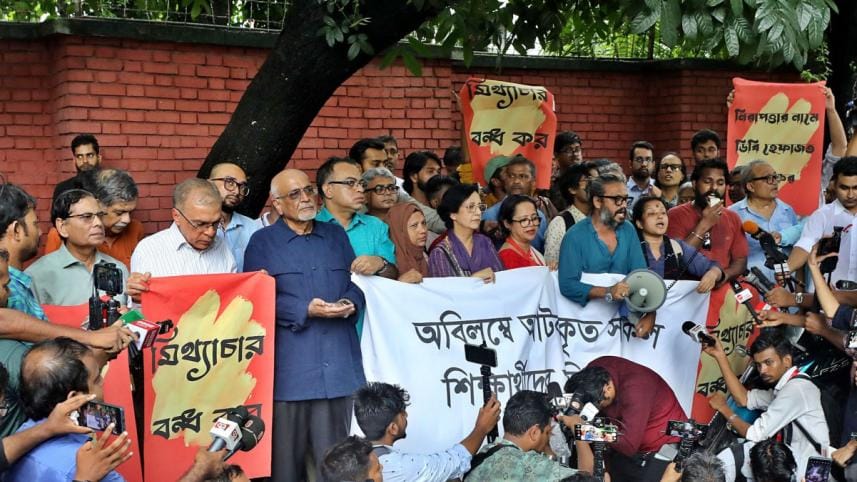Democracy needs civil society to thrive

Civil society in Bangladesh recently demonstrated its strength during the July-August uprising. When the coordinators of the anti-discrimination students' movement were detained in July 2024, civil society groups—including university teachers, artists, journalists, and human rights defenders mobilised to demand their release. Their protests brought attention to human rights violations, such as brutal crackdowns and arbitrary arrests, bolstering public resolve. Despite oppressive measures like internet shutdowns, university dormitory evacuations, and night raids on protesters, civil society's actions became a rallying force, re-energising the movement in late July.
This spirited intervention contrasts sharply with civil society's broader inaction over the past decade. From 2013 to mid-2024, Bangladesh witnessed flawed elections, rampant corruption, enforced disappearances, and systemic governance failures. While civil society organisations (CSOs) like Transparency International Bangladesh (TIB), Centre for Policy Dialogue (CPD), Center for Governance Studies (CGS), and a few others have continued to raise alarms, many professional networks and NGOs remained silent or complicit, aligning with the former regime's "development" narrative. This raises critical questions about civil society's role in fostering democratic accountability.
Several factors have contributed to the erosion of civil society's influence in Bangladesh. Repressive laws, including Section 57 of the ICT Act and its successor, the draconian Digital Security Act (DSA), fostered fear and self-censorship. These laws, with vague provisions criminalising actions deemed offensive or detrimental to public order, were weaponised to silence dissent. Similarly, the Foreign Donations Regulation Act (2016) granted authorities significant control over CSO operations, limiting initiatives critical of government policies. These restrictions, coupled with bureaucratic delays, undermined the independence of many CSOs.
Moreover, funding constraints further weakened civil society. Most Bangladeshi CSOs rely heavily on foreign donations, which often prioritise service-based programmes like healthcare and education over rights-based initiatives promoting democracy and governance. Grassroots organisations, already resource-strapped, struggle to survive in such an environment. The NGO Affairs Bureau's stringent oversight exacerbates these challenges by delaying or denying funding approval for initiatives that diverge from the government's narratives. This dependency on external funding and the overly regulated approval process limits CSOs' ability to advocate boldly for human rights and accountability.
Bangladesh's challenges mirror a global trend of shrinking civic spaces. According to CIVICUS, the country's civic space has been downgraded to "closed," placing it among the most restricted in Asia last year. Crackdowns on activists, journalists, and opposition voices ahead of the January 2024 national elections contributed to this decline. Several studies and indicators echo these findings, showing significant barriers for CSOs engaged in human rights, transparency, and anti-corruption efforts. While Bangladesh excels in service-oriented activities, its civic space for rights-based advocacy has been increasingly constrained over the years. The July uprising, marked by immense bloodshed and sacrifice, successfully ousted the autocratic regime on August 5, sparking hope for reopening civic spaces. The interim government is making efforts to restore these spaces, but the deep divisions within society pose significant challenges, requiring sustained time and effort. However, recurring incidents of mob lynching remain a major concern, hindering the development of a liberal and inclusive civil society.
Historically, civil society has been instrumental in advancing democracy worldwide. In Poland, the Solidarity Movement resisted communist rule and ushered in democracy. In South Africa, civil society organisations and grassroots activists dismantled apartheid through decades of advocacy. The US Civil Rights Movement, led by groups like the National Association for the Advancement of Colored People, achieved landmark victories for racial equality. Similarly, the Indian National Congress began as a civil society-led initiative, mobilising a non-violent movement under Gandhi to secure independence and lay the foundations of democratic governance. Bangladesh itself boasts a proud history of civil society-driven transformation. Organisations like BRAC and Grameen Bank have significantly contributed to poverty alleviation and women's empowerment, gaining global recognition. However, in recent years, many professional groups— journalists, academics, and cultural figures—have prioritised personal gains over their roles as defenders of democracy.
Addressing these shortcomings requires a multifaceted approach to reinvigorate civil society's capacity and independence. Diversifying funding sources is crucial. Over-reliance on foreign donors sometimes compromises CSOs' autonomy and subjects them to political interference. Domestic philanthropy and corporate social responsibility (CSR) initiatives can bridge this gap, fostering sustainable funding models. Encouraging local contributions can also strengthen CSOs' accountability to their communities.
The government must also create an enabling environment for civil society. This involves repealing or reforming restrictive laws like the DSA (rebranded as the Cyber Security Act a year ago) and the Foreign Donations Regulation Act, which stifle dissent and undermine CSO independence. Although the government channels a significant portion of donor funds to CSOs, widespread corruption in allocation often diverts resources to organisations unlikely to challenge authority. Policy reforms are urgently needed to ensure transparency and direct these funds toward initiatives that hold power accountable and benefit the public. Transparent mechanisms for allocating government-administered funds can ensure these resources are used meaningfully.
Equally important is the need for civil society to maintain impartiality and objectivity. CSOs must resist aligning with political factions and focus instead on their mission to promote democratic values, accountability, and social justice. This requires a cultural shift within civil society, emphasising integrity and courage over expediency.
The successes of civil society in other parts of the world offer valuable lessons for Bangladesh. During the Velvet Revolution in Czechoslovakia in 1989, civil society organisations united diverse groups around democratic goals, achieving a peaceful transition from authoritarianism. Similarly, civil society's role in transitional justice in Chile and Argentina in the 1990s underscores its ability to hold governments accountable and promote transparency.
These examples demonstrate that even in repressive environments, resilient civil society institutions can drive meaningful change. As Nelson Mandela aptly noted, "If we want any significant development, we must co-opt civil society." For this to happen in Bangladesh, state institutions, private sectors, and international development partners must collaborate to ensure that civic spaces remain open and vibrant.
The stakes for civil society in Bangladesh have never been higher. Amid mounting challenges to democracy, human rights, and the rule of law, civil society must rise to the occasion. As Larry Diamond, a renowned political sociologist, observed, civil society plays a vital role in limiting state power, fostering participation, and advocating for democratic values. These responsibilities are especially pressing in Bangladesh, where the erosion of civic freedoms threatens the very fabric of democracy.
Civil society matters. Its role as the conscience of a nation cannot be overstated. To safeguard democracy and ensure accountable governance, Bangladesh must protect and empower its civil society institutions.
Asinur Reza is programme coordinator of South Asia Governance Program at The Asia Foundation. He can be reached at asinur.reza@gmail.com.
Views expressed in this article are the author's own.
Follow The Daily Star Opinion on Facebook for the latest opinions, commentaries and analyses by experts and professionals. To contribute your article or letter to The Daily Star Opinion, see our guidelines for submission.




 For all latest news, follow The Daily Star's Google News channel.
For all latest news, follow The Daily Star's Google News channel. 

Comments